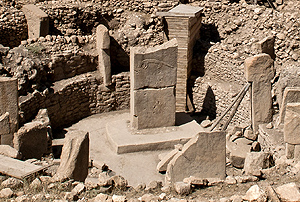Prehistory
„Man ... rarely cares for what is internal.”
„How fleeting are the wishes and efforts of man! how short his time! and consequently how poor will his products be, compared with those accumulated by nature during whole geological periods.”
Charles Darwin
The Origin of Species, Pages 96 & 133
John Murray, Albermarle Street, 1859; Penguin Classics, London, 1985
„This Planet is not fully explored yet. You must know what was before to have a feeling of what will be coming.”
Thor Heyerdahl
At 82 He's Still Exploring
In: National Geographic, September 1997
The Present Past
No single scientific discipline alone covers what I have in mind when I think of ‘prehistory’. For me, prehistory encompasses about the time between the ‘Big Bang’, or ‘singularity’, and the emergence of writing.

erected by early Neolithic people
11.000 years ago.
Teomancimit 2011 commons.wikimedia
The universe is estimated to be 13.75 billion years old, and the earth 4.57 billion years. Compared with other life forms, contemporary man is a relatively young species. According to DNA tests, he only came about 200.000 years ago in Africa and inhabited from there all continents, except Antarctica.
Some defined prehistory as the time between the emergence of modern humans about 200.000 years ago and the invention of writing in Sumer around 4000 B. C. The short time since the invention of writing they then understood as history. Today, one is aware of how problematic a definition of history, which limits history to what is ‘written down’, is. Examples, like the trial of Jesus or the coronation of Charles the Great, make clear that ‘objectivity’ and ‘historicity’ are hardly or not attainable. Much of what we would like to know today has never been written down, simply because it was not important within the horizon of meaning of the writers or undesirable to them to remember.
Who determines by what criteria, what and who will be remembered and what and who not? Most of what people do and experience never gets ‘written down’. It remains, so to speak, ‘exo-historical’, outside of history. But is it therefore also less important and less worthwhile to notice and remember?

front of probably a pioneer steam
locomotive, built in 1863
www.parks.ca.gov Magnus Manske
2008 commons.wikimedia
For example, most of what happens in the train, where I write this now, will fall outside of ‘history’ in the narrow sense. Simply because it will not be written down. However, it will appear somewhere in the annals ‘that a collision with a person’ occurred on the route ahead of the train and that the train therefore will go no further than ’s-Hertogenbosch.
What does not seem extraordinary falls outside of history. Like a teenager, who despairing at the ‘participatory society’, ‘falls’ under a moving train. Fellow travellers were outraged that ‚again such an idiot’ interrupted their travel plans. They demanded seriously, that the Dutch Railways install ‚cattle-catchers as they had in the Wild West’ on its trains, so to speak ‘prehistoric’ ‘obstruction removers’, ‚to wipe these idiots off the tracks’. Whether at the same time humaneness would be swept off the track appeared to these fellow passengers of the ‘participation society’ irrelevant ...
Partially ‘social media’ now bring change to historiography. There also the unknown and powerless can write down their way what is important to them. Whether others now find banal or interesting what they write, whether millions read it or only the authors themselves, it ‘is written’. ‘Who writes remains,’ a saying goes. For whatever was written on Hyves however this saying appeared not valid, and it remains to be seen how long other social media will survive. Even though it may be forgotten what all was written, that was written so widely, will be remembered, because it is new.